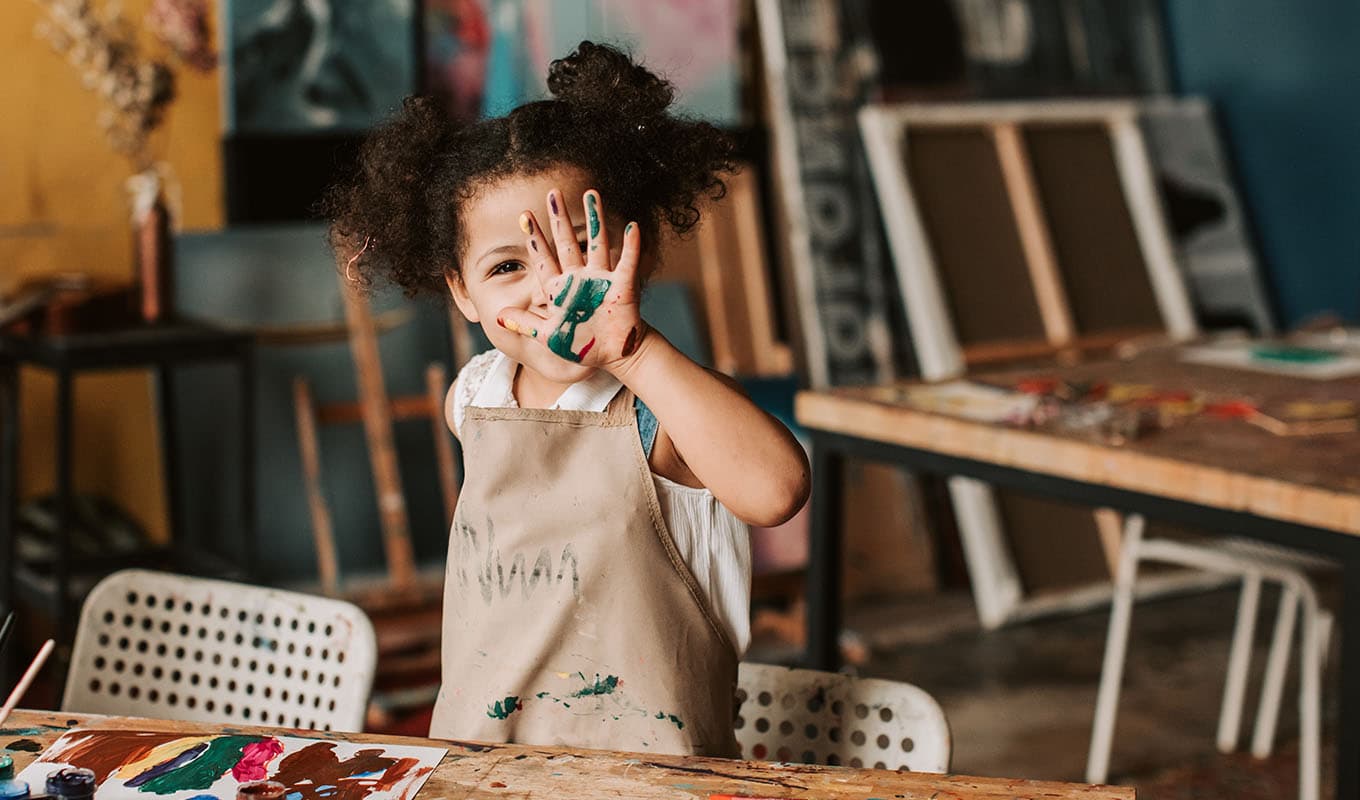Does Being An Only Child Mean You Are Destined To Be Lonely?

The idea that only children are inherently lonely makes sense on the surface with no other built-in socialization or interaction from siblings.
- Loneliness isn’t an inevitable outcome of the only-child experience and what you do as a parent has more influence than you realize.
- Lack of friendships and relationships, based on an inability to connect with others well, is most likely to lead to loneliness in only children.
- Only children who have the opportunity to spend time with other children their age tend to report feeling less lonely during adulthood.
Struggling with loneliness or having a mental health crisis?
- Suicide Prevention Lifeline: 1-800-273-TALK (8255); Deaf or hard of hearing dial 711 before the number or connect via online chat
The thinking goes that only children spend all their time alone, have 100 percent of their parents’ attention, and will be the only ones left at the end of their life.
Not only does this make them lonely but probably spoiled brats, as well.
But loneliness isn’t an automatic outcome of being an only child — nor is selfishness.
These beliefs are often predicated on long-debunked myths about what it means to be an only child in the first place.
That being said, for some only children like myself, yes, loneliness is our reality.
I remember longing for a sibling to play with, someone with whom I could go on the adventures found in my favorite books.
How could I ever go to Narnia or live in a boxcar without brothers and sisters? I’d never survive it alone!
My overactive imagination aside, it wasn’t all excruciating loneliness.
I reveled in holidays and birthdays where I was the sole focus. I understood, even at a young age, that not having to share the wealth was a major benefit.
And I wasn’t always lonely.
In fact, growing up as an only child has allowed me to feel comfortable with solitude and helped nurture a strong sense of independence; I’m perfectly happy with my own company.
On the other hand, it likely contributes to my absolute hatred of teamwork or group activities, too.
Looking back, though, any loneliness I felt had more to do with limited access to kids my own age.
I didn’t grow up with neighborhood playmates or a heavy schedule of lessons, sports, or other activities. Time with other children is one important factor in whether only children feel lonely or not.
In fact, many only children report, as adults, that their lives were far from lonely. And a lot of that has to do with the opportunities they had for connection and socialization.
For parents of only children, it’s not how many siblings you give your children that helps to prevent loneliness.
It’s the mindfulness in which you parent.
Are Only Children Lonely?

The easy answer is that yes, of course only children can be lonely but it’s not necessarily because they’re only children — it often occurs because they don’t have strong social connections with other people, especially those their own age.
A recent study on loneliness in only children from China found a clear disconnect between perception and reality. The belief that only children were lonely was prevalent, according to the data.
The research, however, found that children who grew up with siblings are more likely to be lonely.
Only children have a tendency to talk to themselves more often compared to those who have siblings, which may help to alleviate feelings of loneliness in the process.
Additionally, one study found that only children appear to be better equipped to handle negative life events, experiencing fewer symptoms of depression and post-traumatic stress disorder compared to those with siblings.
If loneliness is perceived as something negative, those findings indicate that only children may have an easier time navigating such feelings.
Another study found that although children who have siblings generally spend more time socializing with their family, only children actually have more contact with their parents compared to those with brothers or sisters.
In fact, only children enjoy positive parent-child relationships far more often than those who have siblings or grew up in larger families.
If you’re worried about an only child being lonely, it’s important to first differentiate between actual loneliness and boredom.
Without enough opportunities for stimulation and activities, only children may simply be bored.
This doesn’t mean, however, that parents need to spend every waking hour with their child or schedule every moment of their day, either.
“Sure there are some only children who are lonely but I’ve also worked with adults who grew up with lots of siblings and felt lost in the shuffle,” therapist Dawn Friedman, MSEd told me.
“One could argue that only children get more parental attention or that their parents are more likely to pursue other relationships for their child through extracurricular activities,” she explained.
For this reason, she added, “Some only children are less likely to be lonelier than kids who grow up with siblings.”
For parents of only children, it’s about finding the balance between opportunity and solitude.
Andrew Selepak, Ph.D., professor at the University of Florida is an example of this balance. He says there simply wasn’t the time or opportunity for him to be lonely:
“I never thought of myself as lonely growing up…because I played sports, I had a lot of friends that I would see when I had games or practice, and I spent a lot of my summer at the Boys and Girls Club.”
Many only children, as adults, report enjoying their ability to work independently or knowing how to entertain themselves. Sometimes, a little boredom can be a good thing.
Parents often believe that having multiple children will guarantee lifelong bonds and love among siblings. While this occurs in many families, that doesn’t mean a child with siblings won’t be lonely.
At the same time, there are countless examples of siblings who hate each other or who make one another miserable during childhood. And it’s always possible to be lonely in a crowd of people.
Some adults, looking back on their childhood, can’t fathom the concept of feeling lonely simply because they were only children.
Marijke van Breda, a PR and marketing manager for Oliver Wicks, recalls being an only child as beneficial to her life.
“I was lucky as I got to spend quality time with my parents and I didn’t have older siblings to pick on me or disrespectful younger siblings,” she said.
A lot of people thought I was spoiled because I was the only child but I didn’t always get what I wanted as a kid,” Marijke explained. “I like to believe I am the independent woman that I am today because I was an only child.”
Not all only children have a positive experience, though. My experiences of feeling lonely as an only child are certainly not unique.
Marianne Stein, communications specialist and mom to three children, remembers her loneliness as an only child very clearly:
“From my personal experience, yes, I was definitely lonely as an only child. It was exacerbated by the fact that there were no other children in my extended family…I was by nature shy and introverted, and the rough-and-tumble life on the playground outside our apartment building, and later in school, was very overwhelming for me.
I was constantly surrounded by adults, and I became a precocious child who did well in school but had no idea how to interact with other kids. Their world was a mystery to me; I pretended to fit it but in reality, felt like I was from another planet.”
I see myself in Marianne’s experience.
While I blossomed into an ambitious, independent adult, I, too, struggled with understanding people in my peer group and making friends my own age.
Even today, in my 40s, most of my closest friends are old enough to be my parents.
Are only children lonely?
Sometimes, but it’s not a unique circumstance to singletons.
In fact, siblings may be lonely more often than their single counterparts because parents of only children may give their children more opportunities for social activities and potential friendship.
Are Only Children Selfish Or Spoiled?

Blame the long-debunked myth of “only child syndrome” from the 1800s which painted only children as selfish, spoiled, bossy little tyrants for today’s worries about only children and their personalities.
A lot has been learned that completely contradicts this portrayal.
The myth took hold and made it easy to believe such awful only children could be lonely. Who would want to interact with and befriend such a child?
Later studies and research have painted a much different picture.
According to Shagoon Maurya, psychotherapist and founder of URSafeSpace,
“Studies show that only children are no different from other kids. Specifically, they’re not more spoiled, lonely, selfish, or overly dependent.
This is because a child’s personality benefits from their parents’ undivided attention and emotional support leading to high self-esteem and maturity. They’re also said to be creative as they learn to entertain themselves and keep them(selves) occupied.”
How you parent your only child can make a big difference in their personality, behavior, and potential loneliness.
According to The Adolescent Only Child, parenting an only child has these 3 characteristics in common:
- The only child is the first and last child in and they are the only chance their parents have of raising a child. This can create a high-pressure parenting situation.
- The only child is the sole beneficiary of the social, emotional, and material resources parents have to provide. Parents may make a high investment in nurturing and providing for their one and only child, thus often causing a high expectation of return.
- The only child has unrivaled access to parents and everything they provide, often becoming “adultized” from primary interaction taking place with parental companions.
As an only child, I can offer anecdotal evidence to support each of these characteristics:
- My parents were overly strict with me, not allowing me to do many activities that were age-appropriate out of fear of harm or poor behavior. I wasn’t allowed to date until long after my peers did.
- My parents didn’t have a lot of material wealth but they believed in the importance of education and put their resources into those opportunities. They also expected me to deliver good grades, which turned into pressure and perfectionism at a young age.
- The biggest compliment I was given as a child was about how “mature” I was. I acted like a small adult, but this made it difficult to make friends with my peers. I didn’t know how to relate to them.
In general, only children tend to exhibit some combination of the following characteristics:
- Independence
- Comfort with solitude
- Self-confidence
- Good organization skills
- Ambitiousness
- Seriousness
- An ability to keep themselves entertained
- Being “mature for their age”
Some of these characteristics may occur because they spend most of their time with adults which is often more structured and less chaotic than a home with multiple children.
Dawn Friedman, the therapist we heard from earlier, explains that only children aren’t the selfish little monsters we’re painted to be.
“Contrary to popular notions of selfish only children, research tells us that only children are better at sharing. This may be because they didn’t have to compete with siblings for resources so they grow up with a stronger feeling of enoughness.
After all, if you never had to fight your sibling for the last cupcake, maybe it’s easier to share cupcakes all the way around.”
How only children are raised and what parents do during their child’s formative years help determine who they become.
Only children aren’t automatically spoiled or unsocialized because of their singleton status.
How To Help An Only Child Not Feel Lonely

Parents of only children may wonder if they should have more children (assuming that’s even an option) to make sure their child doesn’t feel lonely.
There’s no real data to back up the idea that siblings will prevent loneliness.
In fact, a 1987 study showed there were no real disadvantages between being an only child or having siblings.
So what can you do to help your only child feel less lonely and learn how to form bonds with children their own age?
Create Opportunities For Social Interaction With Other Children
This was difficult during the pandemic but it’s still important to seek out social interaction as much as possible.
Schedule playdates. Help your child join a team or find an interest that requires interacting with other people like dance, music, sports, or STEM activities at a local library or museum.
Developmental loneliness can occur when children and adolescents feel out of step with the rest of their peers. Fostering connections through age-appropriate social interactions can help prevent this.
“Parents can start teaching their child about the value of a chosen family by bringing friends into their world. That means having play dates with other families and encouraging your child to invite friends over and go to their houses, too,” advises Friedman, the therapist we spoke to earlier.
Encourage Fun
Only children tend to be perfectionists with a more serious disposition, which can make it difficult to form relationships and understand their peers who do not have those same characteristics.
Encouraging fun and playfulness with your child may help them relate to children their own age when they meet new people.
Quality Over Quantity
Make sure the time your child spends with you and other family members is quality time.
It’s not about how much time you spend together but what you do together that counts the most.
Maintain A Routine
Sometimes loneliness is really just boredom in disguise.
A routine helps your child know what to expect and when. This can create space for social interactions with other children as well as opportunities to entertain themselves and feel less bored.
Avoid Being Overprotective
While there is a tendency for parents of only children to be overprotective, it can easily backfire.
By being overprotective, you may reduce or eliminate their opportunities for social interactions and activities that help prevent loneliness.
Allow your child to experience more of the world and make mistakes on their own. Try to avoid thinking of your child as your “one and only shot to get parenting right” and don’t control everything they do.
A lack of activities and age-appropriate “freedom” to be a kid can make it harder to make friends or to navigate social situations.
This often leads to loneliness for only children.
Consider A Pet
“I think pets are a wonderful way to help an only child feel less alone,” Friedman said. “Bonus, a loving dog isn’t going to swipe your Legos like a little brother might!”
By bringing a pet into the family, you’ll have an opportunity to teach your child about responsibility while also giving them someone to love unconditionally — who also loves them in return.
Encourage Emotional Expression
Give your child space to express their negative emotions about feeling lonely or wanting a sibling.
Bottled-up emotions can lead to overwhelming loneliness. When you can’t express your emotions, they don’t just disappear.
This is an opportunity to allow your child to feel heard and to talk to them about both the good and bad parts of being an only child.
“Even if your child tells you that they wish they had a sibling that doesn’t mean they’re miserable,” Friedman said.
“We can want things we don’t have without regretting all the things we do have. Parents who have an only child don’t need to feel guilty about that.”
Not that parents need any more pressure about the best way to raise children, but you have a lot more influence than you may realize.
Marianne Stein, the only child we heard from earlier adds, “For me, being an only child was a lonely experience, but I don’t think it has to be that way.”
“My main advice to parents would be to make sure they have plenty of opportunities to meet and interact with other kids,” she advised.
“When you only have one child, you can be very involved in everything they do, and that’s not always a good thing. Sometimes it’s better to back off and give the child some space.”
There are several things you can do to help your only child avoid feeling lonely.
Being overprotective won’t help them in the short or long run.
Give them space to be a kid and meet others their own age.
Closing Thoughts
Loneliness can happen for only children as well as in households with multiple children but it’s not an automatic outcome of being an only child.
If you’re the parent of an only child, it’s important to understand that you aren’t harming your child by not having more kids.
There are some amazing characteristics associated with being an only child that can help them succeed later in life, and it’s possible to help cultivate those traits as they grow into adulthood.
You can help prevent loneliness by parenting in a mindful way that helps your child engage in social interactions with their peers and form healthy bonds with others, whether they’re friends, family, or even pets.
Above all, it’s important to remember that the experience of an only child is not better or worse than one who has siblings — it’s simply different.
Editor’s Note: This article is part of The Roots Of Loneliness Project, the first-of-its-kind resource that comprehensively explores the phenomenon of loneliness and over 100 types we might experience during our lives.
Find Help Now
If you’re struggling with loneliness as an only child (or if you’re the parent of an only child who is feeling lonely), we’ve put together resources to meet you wherever you are — whether you want someone to talk to right now, or are looking for longer-term ways to help ease your loneliness.
- Suicide Prevention Lifeline: 1-800-273-TALK (8255); Deaf or hard of hearing dial 711 before the number or connect via online chat
- Resources & Emotional Support For Loneliness
- Volunteer & Pet Adoption Opportunities






